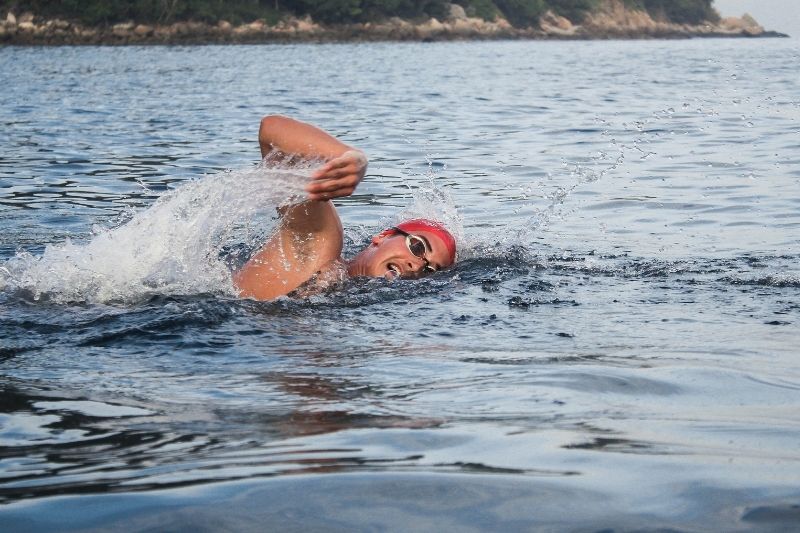No products in the cart.
AFTER SWIM BODY CARE: What You Need to Know!

Swimming is an important life skill and enjoyable activity. It is recommended to achieve good health as well. However, when we swim a lot in chlorinated swimming pools, those chemicals that are meant to protect you from becoming sick can wreak havoc on your body.
Pool chemicals are great for preventing the spread of bacteria, but it’s the same water that can cause dry, itchy skin, eczema flare-ups, and, worst of all, swimmer’s hair.
Swimmers are exposed to these chemicals in three ways:-
- water ingestion while swimming
- inhalation and
- dermal absorption through the skin.
Before we get into the recommendations for the best soaps and body washes, let us delve into more detail about chlorine-induced skin conditions.
What is Chlorine
Chlorine is a chemical whose compounds have been used in different applications, but for this article:- it’s a chemical commonly used in swimming pool water treatment.
It kills bacteria, and its oxidising properties can destroy other harmful microorganisms such as dirt in the water.
Effect of Chlorine on Skin
- Swimmers well know the irritating effects. They come in the form of eye irritation, nasal obstruction and discharge, sinusitis, allergies, and sometimes fevers experienced after swimming.
- Dry skin; Chlorinated water opens up the skin pores. The acids strip off the natural oils from the skin, causing it to dry, become itchy, and irritated.
- Rash; People who are sensitive to chlorine can develop rashes. Symptoms include an itchy red rash, scaling, small bumps, and tender skin. However, this shouldn’t be a cause to worry as there are numerous ways to treat it.
- It is also common to get burns, especially if you have hypersensitivity to chlorine. This situation is caused by too much chlorine in the water than necessary.
- If you already have a pre-existing condition such as eczema, or dermatitis, chlorine exposure will likely worsen. Dryness and eczema flaring may be experienced as the skin reacts to chlorine.
It is advised to use emollient creams and ointments before entering the pool to act as barriers to the water.
Another essential thing to note is that damage to the skin caused by chlorine is different from swimmer’s itch.
Swimmers itch( schistosome cercarial dermatitis) is a skin rash caused by the larva of tiny aquatic parasites. Humans are exposed when swimming in infested waters, for example, lakes, seas, and ponds.
Once released, these parasites penetrate the skin of swimmers and remain there until they die. Within a few minutes of leaving infested water, a person may experience burning and itching of the affected skin area.
Treatment can be done by calamine lotion and administration of antihistamines. You can avoid getting swimmers itch by;-
- Avoiding getting into lakes and ponds.
- Drying yourself with a towel immediately after swimming.
- Avoiding swimming in areas where snails have accumulated.
Tips to Limit Chlorine Effects on Skin
- Shower immediately after swimming to remove any chlorine residue.
- Use a moisturiser to retain moisture in your skin.
- Apply vitamin C to your skin after exposure to chlorinated water. Vitamin C promotes collagen production that thickens the dermis.
- Monitor chemical balance regularly.
- If you have a private pool, tons of other disinfectants can be used instead of chlorine.
- Consult a Dermatologist when you feel that the damage is severe.
What Body Products to Use
Getting chlorine entirely off of your skin might not be as easy as you think. The regular soaps and shampoos often do not eliminate the chlorine build-up or get rid of the smell.
The reason is that chlorine sticks, and the more you stay in chlorinated water, the more it accumulates on your skin and hair. The best remedy is to use swimming-specific body washes to remove the chlorine gently.
After-swim body washes should:-
- Break the chlorine bond. Human skin is an organic tissue which means it quickly absorbs any chemical. You have to make sure the wash you purchase dissolves the chlorine on your skin and hair.
- Gently wash and be mild on the skin. At this point, the skin is already sensitive, so your body wash should be gentle to avoid further irritation.
- Balance pH. Chlorine is alkaline, while the skin and natural hair are slightly acidic. A good body wash should rebalance the pH.
TRIHARD’s After-Swim Body Wash
TRIHARD’s After-Swim Body Wash is formulated with Dead Sea Minerals, Biodegradable Apricot Scrub, and Tea Tree Oil to provide a deep cleansing that extracts pool chemicals and saltwater from swimmers’ skin. It hydrates and rejuvenates dry skin.
This product is paraben-free, SLS-free, alcohol-free, GMO-free, and cruelty-free.
Conclusion
Adopt good skin care practices and while at it, be consistent, avoid switching from one product to another. You should only do pre-swim skincare after clarity about the ingredients in your products;- some products can mix with the chlorine compounds and end up causing further reactions.
While chlorine is an effective sanitising solution with various benefits, it is not without its side effects. If at all possible, you should avoid it, but at the very least, you should get knowledgeable about the risks and limit exposure.
















Leave a Reply